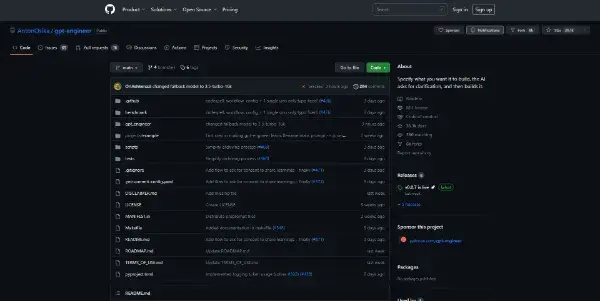GPT Engineer

An AI wizard and code generator that uses your instructions to create code. Current project on GitHub
GPT Engineer: An AI-Powered Code Generation Tool
GPT Engineer is a revolutionary AI-powered tool designed to streamline the coding process. Acting as a virtual coding assistant, it translates natural language instructions into functional code, significantly accelerating development and reducing the burden on programmers. Currently an open-source project hosted on GitHub, GPT Engineer represents a significant advancement in AI-assisted software development.
What GPT Engineer Does
GPT Engineer takes user-provided instructions, expressed in natural language, and generates corresponding code. This means developers can describe the desired functionality of a program in plain English, and the tool will attempt to create the necessary code to achieve it. This eliminates the need to manually write boilerplate code and allows developers to focus on higher-level design and problem-solving. The tool leverages the power of large language models (LLMs) to understand the nuances of programming logic and generate efficient, readable code.
Main Features and Benefits
- Natural Language to Code Translation: The core feature is its ability to translate natural language instructions into executable code. This dramatically speeds up the development process.
- Reduced Boilerplate Code: GPT Engineer automatically generates much of the repetitive, boilerplate code that typically slows down development, allowing developers to concentrate on the unique aspects of their projects.
- Increased Productivity: By automating code generation, GPT Engineer significantly boosts programmer productivity, enabling them to complete projects faster and more efficiently.
- Improved Code Quality (Potentially): While not guaranteed, the tool aims to generate readable and well-structured code, leading to improved maintainability. Careful review and testing remain essential.
- Open-Source and Collaborative: Being a GitHub project, GPT Engineer benefits from community contributions and continuous improvement.
Use Cases and Applications
GPT Engineer finds applications across a wide range of software development tasks:
- Rapid Prototyping: Quickly create functional prototypes to test concepts and designs.
- Generating Boilerplate Code: Automate the creation of repetitive code structures, such as class definitions, functions, and loops.
- Creating Simple Applications: Develop small, self-contained applications from straightforward natural language descriptions.
- Assisting with Complex Projects: Use the tool to generate components of larger projects, reducing the overall development time.
- Learning New Programming Languages: Experiment with different languages by describing desired functionality and observing the generated code.
Comparison to Similar Tools
GPT Engineer joins a growing ecosystem of AI-powered code generation tools. While direct comparisons require benchmarking against specific use cases, it generally falls into the category of tools offering natural language to code functionality. Unlike some commercial offerings which may have advanced features or better performance, GPT Engineer's open-source nature provides transparency and allows for community-driven improvements. It may lack the fine-tuning and extensive testing of commercial counterparts, but its free accessibility makes it a valuable tool for experimentation and learning.
Pricing Information
GPT Engineer is currently free to use. As an open-source project, it relies on community contributions and collaboration.
Disclaimer: While GPT Engineer offers significant potential, it's crucial to remember that the generated code should always be thoroughly reviewed and tested by experienced developers before deployment. AI-generated code may contain errors or vulnerabilities, and human oversight remains essential for ensuring code quality and security.